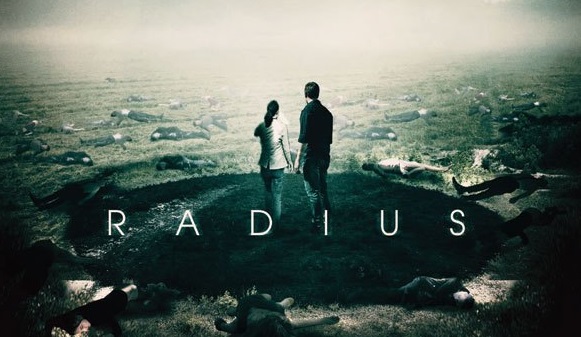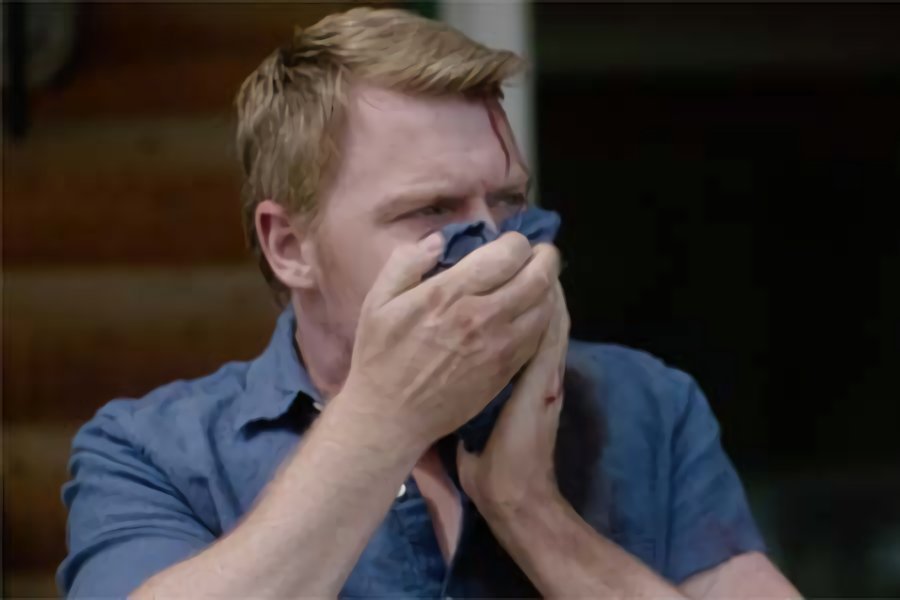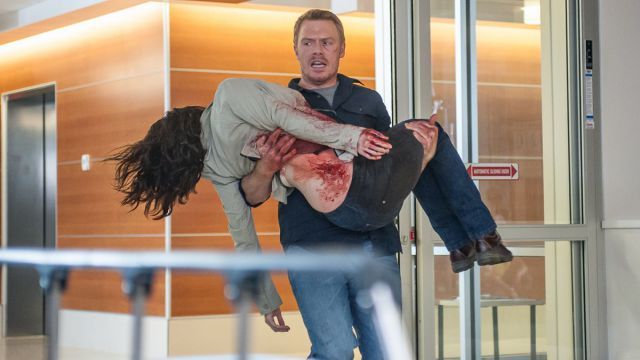I love talking to creatives. (Actually, truth be told, I love talking to anyone. But I particularly like talking to creatives.) I haven’t done as many interviews of late as I like to do, but when I get a chance I jump. Right now I am currently talking to one of the writers on the movie OtherLife and am having a blast learning all kinds of details and trivia about that great little movie. And today I bring to you a conversation I had with Steeve Léonard, the writer and director of the amazing movie Radius. The details and insights he drops on us from a creative and insight standpoint are fantastic. But let me say this super clearly.
THIS INTERVIEW IS LADEN WITH RADIUS SPOILERS
Was that clear enough? So, here are some links for watching the movie for those of you who haven’t seen the movie yet… a link to go watch this great film before you go any further.
I mean, you want to participate in the conversation over on the Radius discussion don’t you? So go see it! Then continue reading. Ok? Great. So with that bit of house cleaning taken care of, let’s jump straight into the conversation that I had with Steeve via Twitter.
Taylor: “Can you tell me where the idea came from? The radius idea and how it evolved? I know you and Caroline” (Caroline Labrèche also co-directed Radius with Steeve) “wrote the screenplay together, did the idea come collaboratively too?”
Steeve: “First of all, if anyone is reading this BEFORE they’ve seen the film, they should stop now. Massive SPOILERS ahead, you’ve been warned! The very first idea we had for the film was after we saw Park Chan-wook’s Oldboy on DVD in 2003.” Taylor interjecting here, and this is a massive call out, if you haven’t seen Oldboy, I just recently saw it on your recommendation and I have to agree with Steeve, it is amazing. I even recently did a detailed walkthrough of it because it was so good. Let me just say, don’t keep reading if you haven’t seen Oldboy! hahah, even if you have seen Radius! Alright, let’s continue…
“The movie just floored us, and we thought “why don’t we try and make something like this? Something with a man and a woman, and they build this relationship together only to have it blow up in their face in the end”? It started out that way. We didn’t write much based on that, but we knew we wanted something along those lines. It was only later that the actual “radius of death” idea came into play. I was looking at old comics on the internet, specifically Superman; I always thought he was kind of boring so I guess I was trying to see if the writers ever did anything good with him. Anyway, I came upon a story arc along the lines of “Superman is banished to remain in orbit around the Earth and never approach it, or else he would make people die”, something along those lines – it’s very blurry to me now. Anyway, I thought this general idea of not being able to approach people – being a walking plague if you will – was pretty strong. So we played around with that and it became this more specific idea of a man who radiates death (telepathically) in a 50-foot bubble all around him. We eventually (more on that later) mixed it with our Oldboy idea and… many many years later, we had something.
Taylor: “Similarly, the 2nd best idea of the movie is how Liam and Jane are connected. Was this another early idea or was it discovered later in the process? How did that come about? Jane came into the story out of necessity.”
Steeve: “When we started writing, we didn’t do an outline our anything. We were so jazzed about the radius idea that we went right into script mode. The beginning of the film came out of that (and it almost didn’t change to this day). We had Liam wake up from a crash, flag down a car only to see that the driver had died, then he got to a diner full of dead people, and finally, he found his house. We had all of this in script form, and then at around page 8 Liam walks into his house and we thought to ourselves “where the hell do we go from here”? If this poor dude can’t approach people, how is he going to investigate his own mystery. So that’s when we got the idea to have a character come in that either 1) cured him, 2) was immune to him, 3) blocked his power. And then the illumination came: “what if she only blocks his power when they’re close together?” That was the real turning point for us. And I think that’s when our Oldboy idea came into play. If we were going to have these two characters linked because of a freak “accident”, then they would also have to be linked in some other way. That’s when we started riffing on the whole end reveal.”
Taylor: “Come on guys. This is creative gold. It’s rare that you hear from writers about their thought processes when creating. And to have Steeve just throwing gold at you hand over fist?!? Seriously?!? So much goodness right there.
“This may sound like a stupid question, but the radius idea hints at a sort of yin and yang thing. Light and Dark in a single unified circle. Was that intentional? If so, did you consider giving Jane an opposite power when separated from Liam? Healing maybe?”
Steeve: “We had something along those lines in previous versions of the script. We had this thing where the people responsible for Liam and Jane’s powers were – wait for it – the military. They had planned to kidnap two people and erase their memory: 1) a normal man, Liam, and infect him with what we called a psychically transmittable disease, and 2) a “special” woman, Jane, and boost her already potent potential (turns out she was a healer, she could suck minor diseases out of people just by being around them long enough). Anyway, the military’s plan (a field test if you will) was to release these two people separately around a small town and see what happens: how many people could the Weapon (Liam) infect before the Shield (Jane) caught up with him and blocked his power. The thing the military didn’t know was that Liam was secretly a serial killer. So, instead of just spreading some mostly harmless disease, Liam was psychically killing people everywhere he went. This version of the script remained for quite a while, but it always felt too X-Files-ish for us. It also felt more like a 6-part miniseries than a movie. We still think it’s kind of cool though.”
Taylor: “That really does feel like an episode, or mini-series spun from the X-files universe. Maybe it’s own mini-universe in the vein of Chronicle. Black oil, the smoking man, the syndicate, the works! hahah. But yeah, just to setup a system like that would take way longer than 100 minutes, let alone to tell a story in that universe. So interesting. Possibly the most difficult feat of making the film might have been your editing balancing act… deciding how to keep the information steadily coming but to also not give it all away too early. Can you talk a little bit about the challenges you faced there?
Steeve: “We always knew that we had to drip-feed information throughout the story in such a way that when it came to the final reveal, the audience would be surprised, but also, they felt like they knew it was coming to some extent. It’s really hard to gauge. You want people to be like: “I knew something was off, I knew it!”, but you also don’t want them to have figured it all out by themselves. We worked really hard at this in the writing process, and that road-map of information has stayed until the final edit. Even that whole sequence at the pond, where we cross edit between 4 timelines (Jane in the cabin, Liam at the pond, Jane in the truck, Liam dumping the body), if you look at our script and compare it to the actual sequence I edited in the finished film, it’s 95% the same.”
Taylor: “Speaks to the value of good writing. Great answer. We here at THiNC. admire writers and screenplay authors above all else. Because it is in the writing that the real magic happens. The idea is cultivated and allowed to grow. But without a great idea and good editing the movie is completely lacking.
“Speaking of which, how has the film been received since the release? There has been quite a buzz about it in my small circle of the internet, hopefully it will be successful enough that it will allow you to continue making more films!”
Steeve: “The film is being well received, which is great. We’ve actually got fans now! There’s a guy on Twitter who is actively writing poems in the voice of Liam! Most critics seem to like the film, especially genre-oriented critics. The movie is also doing well on iTunes, which proves that Caro and I are sellable commodities (ha ha ha)! There are always some people who won’t like the movie, and that’s just normal. We knew that some folks were flat out going to hate it, or that some might be disappointed that the sci-fi elements weren’t present enough, but we knew that going in; that’s what we wanted to do. It’s like a magic trick: focus on my hand here (the sci-fi) while I swap cards with the other one (the human-oriented reveal).”
Taylor: “Oh, don’t get me started on how idiotic mainstream movies are and the literal tripe that they are pumping out day after day. I would literally rather read your screenplay on that military idea of yours than watch another fully baked – destroy the universe – Marvel movie. But I also know I’m strange in that way. But yeah, some won’t like it, and then there are weirdos like us that adore it!! hahah.
“Your and Caroline’s script brings up interesting questions about culpability, past sins, and the potential for salvation. Was Liam’s choice at the end the only option you considered? Were there others?”
Steeve : “One thing that always got us going was this question of: “if your memory is erased, are you still guilty for your past crimes, can you be convicted if you truly don’t remember”? So yeah, we hope that when the movie’s over, you can start a discussion over a beer with friends. Liam’s redemption (or at the very least, his punishment) was always something along the lines of what we have now. At one point we had him living out the rest of his life in seclusion, in snow-covered woods (and you got the feeling that he probably wasn’t going to make it long). We also had a version where his power went away, and after a while he turned himself in to the cops. Our idea was that upon learning and absorbing the fact that he used to be utter scum, the good half of Liam would turn out to be stronger, and it would make him do the right thing.”
Taylor – “Hahaha! Just had a flash of the best ending ever… (Don’t you like Monday morning quarterbacks?) But what if he goes out to the cabin, the power goes away. And he eventually decides that he can’t live with the guilt, and he turns himself in as a total psychotic husk of a human. He’s powerless, and lead into his cell… then all of a sudden everyone within the radius, both above and below, they all die! Quick quit to Liam’s startled reaction, cut to black roll credits! hahaha. It’s starting all over again. And oh by the way, you have your sequel setup! hahah.”
Steeve: “We once had this idea for a post-credit sequence where Liam’s corpse was being transported in a military plane full of scientists and soldiers or whatever, and it was understood that he was going to be taken somewhere and dissected and studied for possible weaponization purposes… anyway, the camera crawls into the room where his corpse is kept and then, bam! — his eyes open wide, he gasps for air — he’s alive — he can’t die! And then everyone in the plane dies from the radius power that has just reactivated. With the pilot dead, the plane crashes down somewhere, and Liam survives. He crawls out of the wreckage, the only survivor… he looks around… confusion washes over his face… he can’t remember a goddamn thing — total amnesia — again! A bird crashes down dead next to him — cut to black — roll remaining credits! Hahahahaha! Totally over the top and unnecessary!”
That is the greatest thing ever. Thanks so much Steeve for taking the time out to chat with me about your fantastic movie. Again everyone, join us over at the original Radius post in order to discuss in more detail what exactly happened in the movie. I found this chat with Steeve to be really illuminated from a creation standpoint for the film. And I think there is nothing like talking to the creators directly to find out more about their creative thought processes.
If you have any other questions for Mister Leonárd, fire ’em at me in the comments. I’m sure he’d be open to a couple more from you guys. He really was a fantastic interview, very accessible and amenable to my crazy ideas! hahaha.







